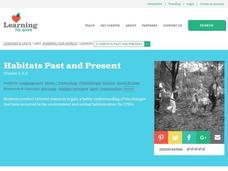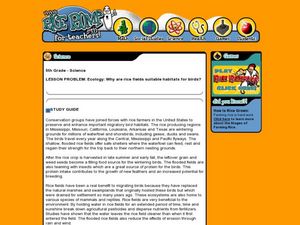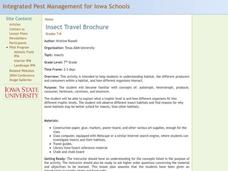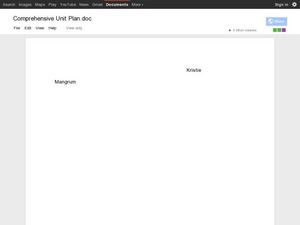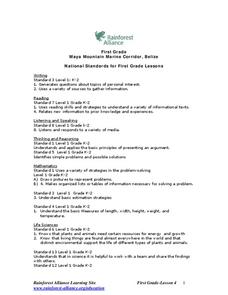Curated OER
Habitats Past and Present
Students explore the changes in animal habitats. In this ecosystem lesson, students use the Internet to explore the changes in the environment since the 1700's. Students complete a Venn diagram to compare the differences in the animal...
Curated OER
Ecology: Why Are Rice Fields Suitable Habitats for Birds?
Fifth graders discover the uses for rice by reading about the habitats of certain birds. In this agriculture lesson, 5th graders research birds from the Gulf Coast and California and their reasons for living in rice fields....
Curated OER
Water Around Us
Students create a collage of human land use activities around a body of water. Students evaluate the effects of different kinds of land use on wetland habitats, and create a list of pros and cons for each land use.
Curated OER
Where Are the Dinosaurs?
Students explore the concept of extinction by studying dinosaurs. In this extinction lesson, students watch dinosaur video clips or complete a puppet finger play about dinosaurs. Students may then complete a dinosaur diorama or a...
Curated OER
Forest Habitats
In this identification lesson, 3rd graders view photographs of different kinds of forests, learn where forests are located, and discuss seasonal changes in forests. Students read Look What I Did With a Leaf, collect leaves, identify...
Curated OER
Habitats and Components School Forest Lesson Plan
Second graders go on nature scavenger hunts. In this nature scavenger hunt lesson, 2nd graders explore the natural habitat of their school grounds and make observations regarding the objects and animals they find in the air, on the...
Curated OER
Dragonfly Sculptures
Art projects are great when they apply to other subjects. First study insects, their parts, and their habitats. Then have little ones create a dragonfly. They use clothes pins, raffia, pipe-cleaners, and paint to construct their...
Curated OER
Science NetLinks: Burrowing Owls
Students investigate the example of the burrowing owl to illustrate how human activities can control the fate of species. The research is focused on the ecosystem and examining the different species within it.
Curated OER
The Lesson: Species Under Threat
Students consider the plight of endangered species. For this global studies lesson, students research selected websites about endangered animals and identify global issues that contribute to their demise.
Curated OER
Bugging Out
Learners explore how insects behave in their natural habitats and build dioramas to create an Insect World in their classroom. They investigate various insects and the roles they play in the environment. They write creative short...
Curated OER
Hands on Habitat
Students teach others about habitats. In this Science lesson plan, students use a Science Log to record data about a habitat for research. Students analyze the data and construct an eco-chamber. Students share what they have found with...
Curated OER
A House for Me- Ocean Environments
Students explore ocean environments. In this ocean environment instructional activity, students identify the things ocean animals need for survival. Students use KWL charts and search the Internet collecting information about ocean...
Curated OER
Animal Bingo
Students discuss facts about animal habitats. In this animal lesson, students recall animal facts about habitats in an animal Bingo game. Teacher pieces and cards are already created and ready to print out.
Curated OER
Insect Travel Brochure
Students explore the concept of insects and their habitats. In this insect habitat lesson plan, students create travel brochures for particular insects. Students must include habitat, producers, and consumers with in the...
Curated OER
Biology In Elementary Schools
Students classify animals into six major animal groups and describe the characteristics of the animals found within each group. In this living and non-living animals lesson, students observe a variety of animals, both living and...
Curated OER
Rainfall Mapping
Young scholars explore rainfall and habitats. In this rainfall lesson, students explore the relationships among rainfall, vegetation, and animal habitats. Resources are provided.
Curated OER
Design a Reef!
Students explore coral reef ecosystems. In this ecosystems science instructional activity, students research coral reef ecosystems to determine the major functions the participating organisms must perform. Students construct...
Curated OER
Comparing Habitats: Ocean and Rainforest
In this habitat worksheet, students will draw a Venn diagram and compare a rainforest habitat with a coral reef habitat. Students will follow step by step directions to complete the activity.
Curated OER
The Life Cycle of the Mealworm
Fourth graders provide a habitat for live mealworms and observe their life cycle. In this animal life cycle and scientific inquiry lesson, 4th graders create a habitat for a live mealworm and observe and record related data as it grows....
Curated OER
Fred the Fish -- A River Ran Wild
Students apply cause and effect relationships to water pollution in a stream. In this pollution lesson students recognize the importance of clean water in their daily lives. Students accompany "Fred the Fish" as he travels down stream....
Curated OER
Who Takes Care of the Maya Forest Corridor?
First graders study the animals in the Maya Forest Reserve. In this conservation lesson, 1st graders create a graph to compare the environment of animals to their own. They design a 3D model of these two environments.
Curated OER
Creating a Pond Habitat
Students create a pond habitat inside and outside their classroom. In this pond lesson plan, students create a habitat with animals, water, and plants in order to create a proper pond habitat.
Curated OER
Cycles of Life in an Urban Habitat: Changes in Biodiversity
Second graders compare and contrast animate and inanimate objects. In this environmental science activity, 2nd graders create simple food webs. They observe their environment and create a collage about it.
Curated OER
I spy (Camouflaged Animals in Art!)
Students create a picture of a camouflaged animal in its habitat. In this visual arts lesson plan, students look at Hans Hoffmann's painting A Hare in the Forest and discuss the animal's camouflage. They research their own animal to...


